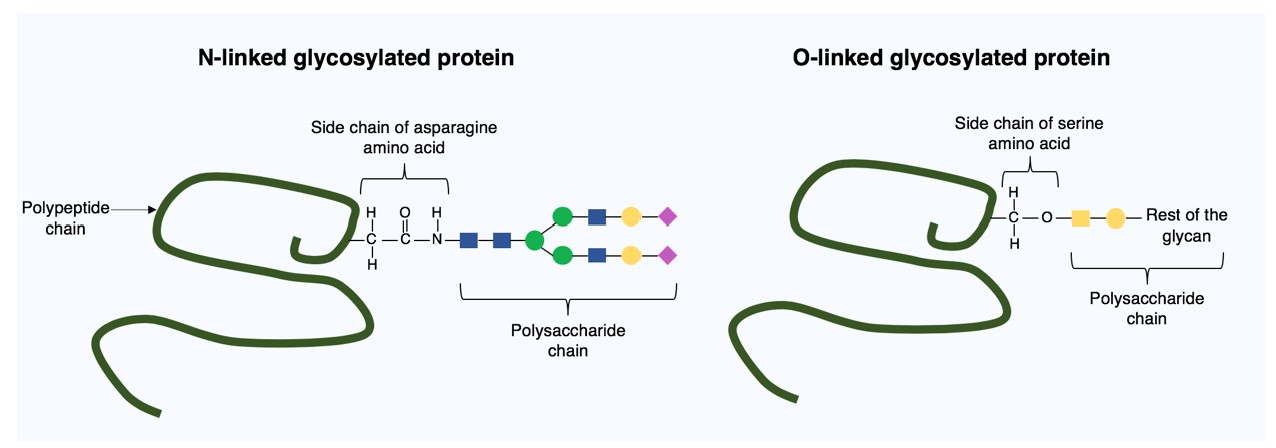Glycoprotein Definition
Glycoprotein research began in the early 20th century and achieved significant progress with the development of biology and chemistry, especially protein engineering and biochemistry. Entering the 21st century, the discovery and application of novel technologies contributes to the amazing achievement of glycoprotein research. In recent years, Creative Biolabs has explored the field of glycoprotein research actively and gradually grown into a world-leading service provider in protein engineering including glycoprotein studies. Based on our support technologies, we launched a mature glycoprotein research platform and offers commercial and customized services to our client all over the world. To help you better understand our glycoprotein-related services, we are pleased to introduce the background of glycoprotein to you.
 Fig.1 O-linked and N-linked glycoproteins.1
Fig.1 O-linked and N-linked glycoproteins.1
Glycoprotein Definition
As early as 1907, when very little was known about glycoproteins, they were defined by the Committees on Protein Nomenclature of the American Society of Biological Chemists and the American Physiological Society as ‘compounds of the protein molecule with a substance or substances containing a carbohydrate group other than a nucleic acid’. This definition includes compounds referred to as mucopolysaccharides or proteoglycans.
Glycoproteins are widely distributed not only in animals but also in plants, unicellular organisms, and even viruses. Moreover, biosynthetic studies on a number of glycoproteins from diverse sources have indicated that these proteins have in common not only covalently linked carbohydrate units, but also a similar type of enzymatic machinery to attach the sugar residues to the completed peptide chain.
Glycoprotein Nomenclature
The nomenclature of glycoproteins was determined officially in 1985, as well as glycopeptides and peptidoglycans, two subclasses of glycoproteins. In this nomenclature, the carbohydrate unit, glucoside bonding mode, and attached amino acid residue are required to be expressed in the official name. Moreover, some glycoproteins contain repeating monosaccharides, disaccharides, oligosaccharides, polysaccharides, or carbohydrate derivatives, which also should be shown in the name of glycoprotein names such as sulfation or phosphorylation. Similar to glycoprotein, the general nomenclature of glycopeptides and peptidoglycans was published based on the same principles.
Glycoprotein Bioactivities
The known or presumed functions of glycoproteins are diverse, spanning a wide range of vital biological activities. Almost all the proteins of plasma contain carbohydrates and fulfill such varied roles as transport, clotting, and antibody activity. Gonadotropins from both pituitary and placental origin are glycoproteins, as are thyroid-stimulating hormone and thyroglobulin, the thyroid hormone storage protein. A rapidly increasing number of proteins with enzyme activity, including various hydrolases, oxidases, and transferases, are being reported to contain covalently bound carbohydrates. These originate from a large variety of tissues and organisms throughout the phylogenetic scale. The protective and lubricating roles of the glycoproteins from epithelial secretions are well known. Moreover, glycoproteins on the surface of bacteria or viruses play a role in the process of infection.
Through more than one hundred years of development, the importance of glycoproteins was generally realized, while glycoprotein technologies have been widely used in research. Nowadays, Creative Biolabs has established a comprehensive glycoprotein research platform to provide convenient and inexpensive services to satisfy our clients all over the world. Please feel free to contact us for more detail.
Reference
-
Image retrieved from https://commons.wikimedia.org/wiki/File:Glycosylation_of_a_polypeptide.png, Kep17, 2020, used under CC BY-SA 4.0, without any modification.
For Research Use Only.
Resources

 Fig.1 O-linked and N-linked glycoproteins.1
Fig.1 O-linked and N-linked glycoproteins.1
